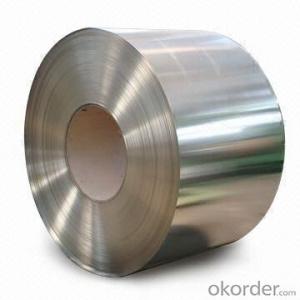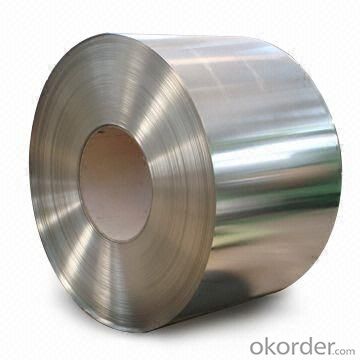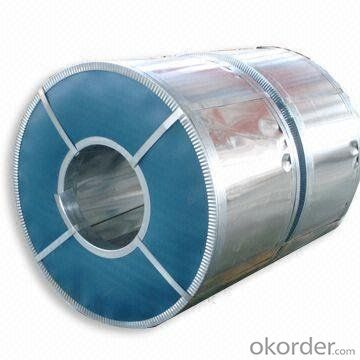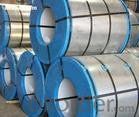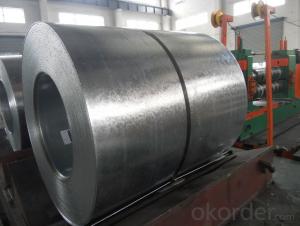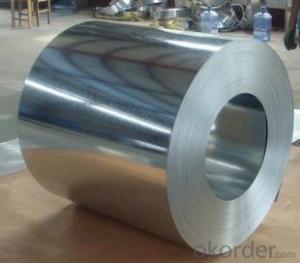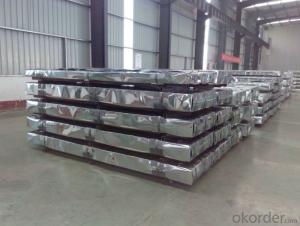hot-dipped galvanized steel sheet Prime
- Loading Port:
- Shanghai
- Payment Terms:
- TT OR LC
- Min Order Qty:
- 25 m.t.
- Supply Capability:
- 10000 m.t./month
OKorder Service Pledge
OKorder Financial Service
You Might Also Like
Quick Details
| Standard: | DIN,GB,JIS | Grade: | SPCC | Thickness: | 0.14-0.6mm |
| Place of Origin: | Shandong China (Mainland) | Brand Name: | Type: | Steel Coil | |
| Technique: | Cold Rolled | Surface Treatment: | Galvanized | Application: | PPGI or corrugated roofing sheet |
| Width: | 750-1250mm | zinc coating:: | 60-120g/m2 | spangle:: | regular / minimum spangle |
Packaging & Delivery
| Packaging Detail: | seaworthy standard export packing or as per customer's request. |
| Delivery Detail: | within 15-20 days upon receipt original L/C or prepaid money |
Specifications
Thickness: 0.14-0.6mm
Width: 750-1250mm
We have passed the ISO 9001-2000 and SGS certificate.
Gi Steel Coil / Sheet
Size: 0.14-0.6mm*750-1250mm
Zinc Coating: 60-150g/m2
Surface Processing: regular spangle; minimized spangle
Chemical Processing: chromated, passivated, unoiled, hot dip galvanized
Coil ID: 508/610mm
Packing: the standard export package
Application: PPGI coil;construction,hardware,
home appliances,interior decoration etc.
Specifications
galvanized steel coil
1.Thickness:0.135-4.0mm
2.Width:600-1500mm
3.Zinc:40g-275g
4.Material:SGCC,DX51D,G550,SPGC,etc.
product name | Galvanized steel coils |
thickness | 0.135mm-4.0mm |
width | 600mm-1500mm762mm,914mm,1000mm,1200mm,1219mm,1250mm |
zinc coating | 40g,60g, 80g, 90,100g, 120g, 140g,180g, 200g, 250g, 275g and so on. |
standard | ASTM, AISI, DIN, GB |
material | SGCC,DC51D,DX51D,DX52D,,SGCD,Q195,Q235,SGHC,DX54D, S350 GD, S450 GD,S550 GD |
spangle | zero spangle, regular spangle or normal spangle |
surface treatment | chromated and oiled, chromated and non-oiled |
packing | export standard. |
payment | T/T, L/C or DP |
min order | 25 tons (one 20ft FCL) |
coil weight | 3-8ton or as client requirement. |
quality | soft or hard quality |
Galvanized steel coils
STEEL GRADE | CHEMICAL COMPOSITION % | MECHANIC PROPERTY | C.B OF COATING | COATING | ||||||||||
C | Si | Mn | S | P | T.S | Y.S | E.L | |||||||
x103 | x103 | x102 | x103 | x103 | Mpa | Mpa | % | d=0 180° | G/M² | |||||
JIS G3302 SGCC | 12 | 30 | 41 | 31 | 21 | 480 | 300 | 13 | OK | Z60-150 | ||||
JIS G3302 SGCH | 12 | 10 | 21 | 18 | 8 | 680 | 650 | OK | Z60-150 | |||||
ASTM A653 CS.B | 20 | 30 | 60 | 35 | 30 | 386 | 205~380 | 20 | OK | Z80-275 | ||||
DX51D+Z | 29 | 21 | 18 | 1.8 | 11 | 355 | 245 | 38 | OK | Z80-275 | ||||
G550 | 20 | 6 | 73 | 5 | 17 | 715 | 654 | 8 | OK | Z80-275 | ||||
- Q: Why can steel HPB300, steel plate without Q300, steel structure manuscript review, but also continued the Q235, why not improve it?
- HPB's full name is hot rolled round steel (HPB is Hot-rolled Plain Steel Bar) in English, commonly known as wire rod, diameter 6 - 12 rounds of the most common, including HPB235 and HPB300. You haven't met HPB400?. HRB400 and RRB400 are treated steel bars in order to have such high strength. But the general strength, ductility will be reduced, as the saying goes, "tossing" is not resistant to toss about.
- Q: Can steel sheets be formed into complex shapes?
- Yes, steel sheets can be formed into complex shapes through various processes such as bending, rolling, and pressing.
- Q: How is the weight of the steel plate calculated?
- Steel plate is made of molten steel, cooled and compressed into flat steel.The steel plate is flat, rectangular, and can be rolled directly or cut from a wide strip of steel.
- Q: Are the steel sheets suitable for automotive body repairs?
- Yes, steel sheets are commonly used in automotive body repairs due to their durability and strength, making them suitable for repairing damaged car bodies.
- Q: Can steel sheets be used for manufacturing storage racks or shelves?
- Yes, steel sheets can be used for manufacturing storage racks or shelves. Steel is a strong and durable material, making it suitable for supporting heavy loads and providing long-lasting storage solutions. The versatility of steel sheets allows for customization in terms of size, shape, and design, enabling the creation of efficient and robust storage racks or shelves.
- Q: What is the average lifespan of galvanized steel sheets?
- The average lifespan of galvanized steel sheets can vary depending on various factors such as the quality of the galvanization process, environmental conditions, and maintenance. However, in general, galvanized steel sheets can last for several decades, with some estimates suggesting a lifespan of around 50 to 100 years or more.
- Q: What is the difference between a black and pickled steel sheet?
- Distinguishing a black steel sheet from a pickled steel sheet primarily lies in their surface finish and the processes they undergo. To begin with, a black steel sheet, also referred to as hot-rolled steel, is manufactured through a technique known as hot rolling. In this procedure, the steel is heated beyond its recrystallization temperature and passed through rollers to achieve the desired thickness. Consequently, the resulting sheet exhibits a dark, rough, and scaly surface, which is why it is referred to as "black steel." The dark appearance is a consequence of the oxidation that transpires during the hot rolling process. On the contrary, a pickled steel sheet is produced by means of pickling. Following the hot rolling stage, the black steel sheet undergoes a treatment where it is immersed in an acidic solution, typically hydrochloric acid or sulfuric acid. This pickling process eradicates the oxide scale from the surface of the black steel sheet, resulting in a smooth and clean surface. Additionally, the pickling process aids in enhancing the steel's resistance to corrosion. The selection between a black steel sheet and a pickled steel sheet is contingent upon the intended application. Black steel sheets are often favored for structural components, such as beams and columns, where the surface appearance is not a crucial factor. On the other hand, pickled steel sheets, with their smooth and clean surface, are commonly utilized in applications that demand a high-quality finish, such as automotive panels, appliances, and architectural elements. In conclusion, the primary disparity between a black steel sheet and a pickled steel sheet lies in their surface finish. A black steel sheet possesses a rough and scaly surface due to oxidation during hot rolling, while a pickled steel sheet exhibits a smooth and clean surface subsequent to undergoing a pickling process to eliminate the oxide scale.
- Q: Are the steel sheets coated with any protective material?
- Yes, the steel sheets are coated with a protective material to prevent corrosion and increase durability.
- Q: What is the price range for steel sheets?
- The price range for steel sheets can vary greatly depending on factors such as the size, thickness, quality, and market conditions. However, generally speaking, steel sheets can range anywhere from $30 to $150 per sheet.
- Q: What is the maximum width of a steel sheet?
- The maximum width of a steel sheet can vary depending on various factors such as the manufacturing process, equipment capabilities, and industry standards. In general, steel sheets can be produced in widths ranging from a few inches to several feet. However, in certain specialized applications, wider steel sheets exceeding 100 inches or more may be available. It is best to consult with steel manufacturers or suppliers to determine the maximum width options they offer, as it can vary depending on the specific requirements and capabilities of the production facility.
Send your message to us
hot-dipped galvanized steel sheet Prime
- Loading Port:
- Shanghai
- Payment Terms:
- TT OR LC
- Min Order Qty:
- 25 m.t.
- Supply Capability:
- 10000 m.t./month
OKorder Service Pledge
OKorder Financial Service
Similar products
Hot products
Hot Searches
Related keywords
